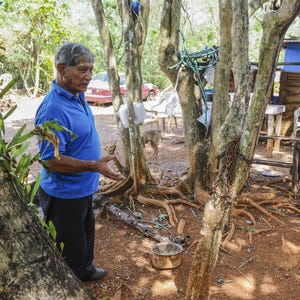Congress’ years of failure to approve a $216 million, 15-year funding package for Palau has caused frustration with the island nation’s citizens, who have given the United States exclusive military access to Palau for decades.
Ambassador Hersey Kyota voiced Palau’s sentiment at the House Natural Resources Committee’s Insular Affairs Subcommittee hearing Wednesday in Washington, D.C.
“The resulting delay is not understood by, and is a matter of great frustration, among the people of Palau and its friends in the Pacific,” Kyota’s testified, on behalf of Palau President Tommy Remengesau Jr.
Congress’ delays in approving another round of funding for Palau, comes at a time when China is courting the support of Pacific island nations.
Gregorio Sablan, the Northern Marianas congressional delegate, is the chief sponsor of legislation that seeks congressional funding approval for Palau. Guam Delegate Madeleine Bordallo and Hawaii lawmakers are supporting Sablan’s efforts, congressional records show.
Strategic area
Sablan testified at the congressional subcommittee hearing that Palau has become an “increasingly important and strategic area of the world.”
While Palau has given the U.S. military access to the island nation for defense purposes, the delay by the U.S. in approving the funding assistance for Palau makes “it seem as though the United States is not good for its word,” Sablan said.
The Defense Department has sent letters to Senate and House leadership, expressing support for inclusion of funding for Palau in the National Defense Authorization Act for 2017, which is a good sign, Sablan said, “but we must reach the finish line.”
The United States runs the risk of losing Palau as a strategic partner if Congress fails to approve the renewal of the island nation’s Compact of Free Association agreement, Bordallo said Thursday. The agreement also allows Palau citizens to live and work in Guam and other U.S. jurisdictions, and has allowed Palauans to volunteer to serve in the U.S. military.
“Renewal of the Palau compact is crucial to our country’s continuing strategic rebalance to the Asia-Pacific region,” Bordallo said.
China concerns
Beijing is concerned the redeployment of U.S. troops to Guam and the proposed development of a training range in the Commonwealth of the Northern Mariana Islands are directed against China, wrote Kristien Bergerson, a senior policy analyst at the U.S.-China Economic and Security Review Commission, in a March 2016 research report, “China’s Efforts to Counter U.S. Forward Presence in the Asia Pacific.”
“While Beijing is concerned about the U.S. military footprint, China’s tourism industry has been acquiring hotels and apartment buildings in Palau and hotel and casino development projects in Saipan, as well as establishing Chinese-operated tour organizations in the CNMI,” the report stated.
Congress created the commission in 2000 to submit an annual report on the national security implications of the bilateral trade and economic relationship between the United States and the People’s Republic of China.
Palau’s Compact of Free Association agreement with the United States hasn’t been renewed since it expired in 2009, according to Bordallo. The U.S.-Palau agreement reached in 2010 awaits approval by Congress.
Federal funding
While waiting for congressional approval of U.S. funding for Palau, the federal government continues to provide about $13 million a year in funding assistance to Palau, according to a federal report.
Since 2011, the United States has provided $79 million in economic assistance to Palau through annual appropriations, according to the U.S. Government Accountability Office in a recent report to Congress.
If Sablan’s H.R. 4531 were enacted, Palau would receive approximately $30 million more in U.S. assistance through fiscal 2024 than it would receive under the 2010 agreement, according to the GAO report.
This set of lawmakers in Congress have several months remaining in their terms, and many of them are busy trying to get re-elected, including Bordallo.
In April, a U.S. Senate subcommittee held hearings for the proposed Compact renewal.
High-power lobbyist
Palau has spent years waiting for Congress’ approval of a new round of funding assistance, even with the help of a former part-time federal government bureaucrat who also worked as a lobbyist for Palau and Puerto Rico.
In one of the State Department cables released by WikiLeaks last year, lobbyist Jeff Farrow directly emailed to then-Secretary of State Hillary Clinton that Palau was “offended by U.S. positions” during 2009 negotiations on the Compact funding.
Farrow described in his email to Clinton that, despite a statement by “very impressive Palau reps” at a June 2009 negotiation, “the Palau delegation was deeply disappointed with the response of the United States delegation.”
Two days later, Clinton forwarded the email to Jacob Sullivan, her deputy chief of staff, and wrote: “Jake --- Pls review, do some recon outreach and advise what, if anything, we should do. Thx. H.”
Clinton’s emails, including emails from Farrow on Palau, have received national media and watchdog groups’ scrutiny because Farrow, as a lobbyist for a foreign government, had direct email access to the State Department’s top boss.
Farrow’s emails to Clinton on Palau was listed as No. 4 out of the “Top 10 Most Ethically Challenged Hillary Emails,” published in March 2016 by the Foundation for Accountability and Civic Trust.
Compact migrants
While supporting funding for Palau, Bordallo also repeated her call for Congress to take action on her proposal to further help Guam, Hawaii and other U.S. jurisdictions afford public services provided to immigrants from Palau, the Federated States of Micronesia and the Marshall Islands.
She said Guam and other host jurisdictions of these immigrants “spent hundreds of millions to support the compacts and migrants, and Congress must provide relief that would alleviate these costs.”
GovGuam reported to the federal government earlier this year that it spent $149 million to provide services to Compact migrants in 2015, raising GovGuam’s tally to close to $1 billion over a dozen years, a federal office’s report to a U.S. Senate committee states.
Before last year’s reported cost, GovGuam has sought reimbursement from the federal government for $825 million that the local government reported as the cost of services to regional migrants from 2003 to 2014.
The federal government has provided about $33 million a year in Compact funding assistance, which Guam shares, primarily with Hawaii.
However, the GAO has said in a report that GovGuam’s numbers, as well as the tab presented by other local governments which host of the regional migrants, are in doubt. GAO questions the accuracy and credibility of the numbers, in part because the host local governments “did not include federal funding that supplemented local expenditures, or include revenue received from Compact migrants,” the office stated in a report.
Impatient friend
While Palau has been a staunch ally of the United States, Bordallo said further congressional delays could strain the United States’ friendship with the island nation.
“The people of Palau are patient, but their patience is being seriously tested,” Kyota said. “Approval of the agreement is now critical — not just for Palau, but because of the dynamic changes occurring in the Western Pacific.”







No comments:
Post a Comment